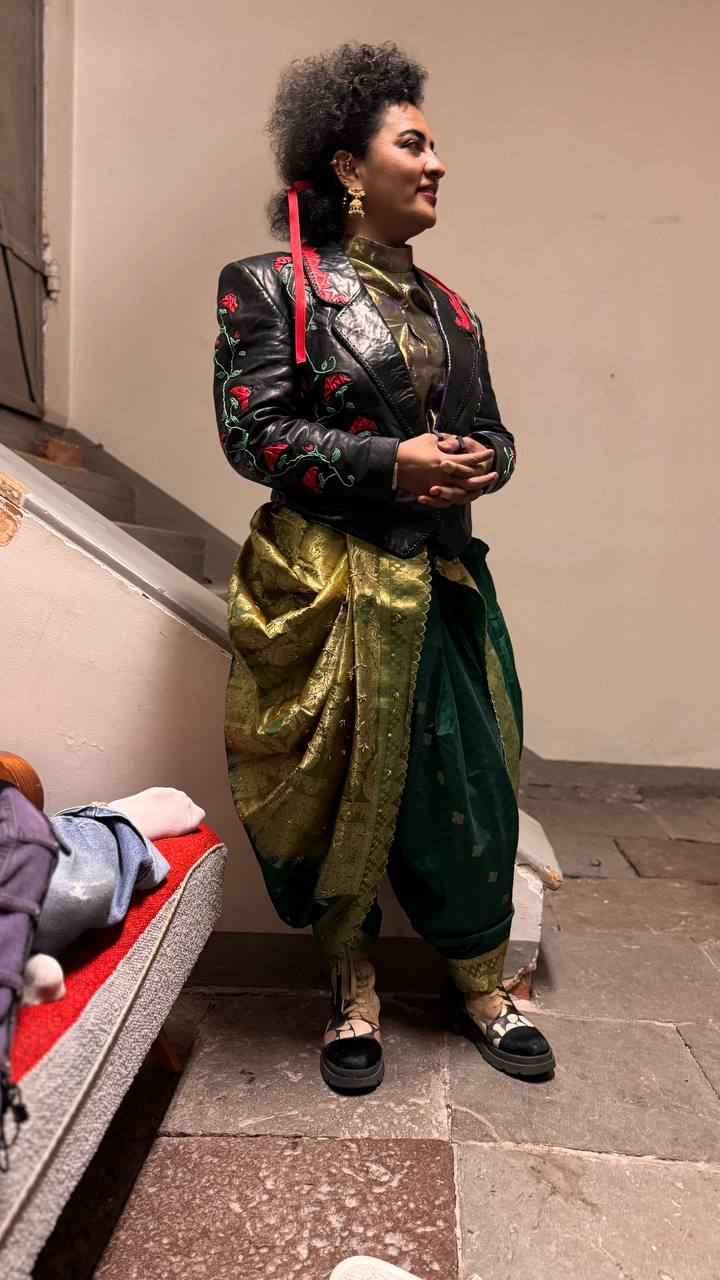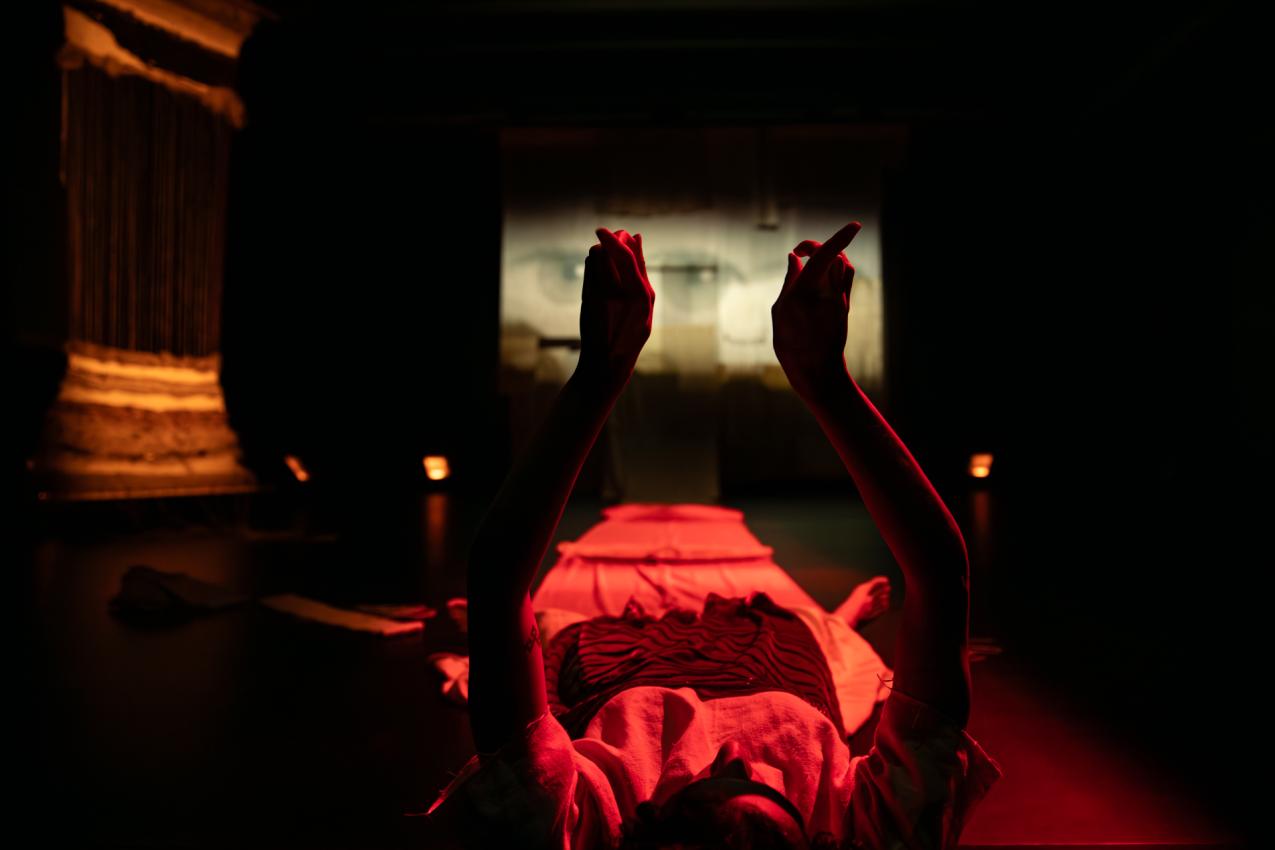In "Kuukauden kynä" (Pen of the Month) series, different writers take a deep dive into the Zodiak's premieres from their preferred perspective. This time performance artist Vishnu Vardhani RAJAN wrote about ATROPOS by Lydia Touliatou.
A Body Thinking Death
I'm leaving the theater and my muscles are telling me a story about rest I haven't experienced yet.
My body thinks it just woke up from the deepest sleep.
Full belly, safe house, no more wars.
Except I'm walking, not sleeping.
My body tensed, and relaxed.
Desensitization and empathy are entangled—one wearing the other's costume, or maybe they've become the same thing and I can't tell anymore
*
Her fingers are already in the fabric when we walk in. Working, not waiting. Threads moving through her hands like they're alive, like they have agency.
My hands twitch in my lap.
Katakamukha appears on the screen. Then Soochi. Chandrakala. Mrigasheersha.
The words feel too big for my mouth but I try them anyway, silently. They taste ancient. They taste like something I've lost.
*
She keeps making the same gesture. A needle. Then loneliness. Then a body. Then direction, pointing somewhere I can't see.
My brain does this too—loops the same shape until it becomes five different things. Same movement, different universe each time.
There's a large needle at the end of the tapestry. She's moving toward it and something in my stomach drops. The needle is the body is the loneliness is the direction. Everything collapses into everything else.
I thought I came here with questions about cultural appropriation.
That's not the question anymore.
*
She executes tight adavus, her feet cutting angles into the floor—precise, geometric, classical—and then her shoulder drops into something ordinary. Adjusting her costume? Breaking character? I can't tell.
My ribs expand. Oh. This is what I feel like inside. Not smooth integration. Collision. The hyphen isn't a bridge, it's a crash site.
In that collision, something rare happens. Meaning becomes elastic. A single gesture becomes a universe. It's not appropriation but conversation—not erasure but exchange. The work lives in the space where traditions touch and neither comes away unchanged.
Nobody told me I could love watching something refuse to pretend.
*
The lighting is so dim I have to lean forward, neck straining, body participating in the act of seeing. Accessibility falters; intention blurs. Yet the blur feels thematically apt: how do we perceive what's half-erased?
My whole upper body is engaged now. Trying to see her hands in the shadow. The precision keeps disappearing.
Is this deliberate?
Am I supposed to work this hard?
My neck hurts. I'm dancing too now, just sitting here.
*
Everything goes red.
"WOW."
That was my voice. I didn't authorize that.
Her hands: scissors. The shears that cut your thread when your time is up. And something happens—she stops being a person performing a goddess and becomes the goddess. Atropos is in the room. Death walked on stage.
I hear ankle bells that aren't there. Phantom bells ringing in my ears, in my chest. The thing that's absent is the loudest sound in the theater.
Her feet stamp and my heart matches the rhythm. We're doing this together now.
But where's the pleasure?
My body asks this before I do. Where's the joy in working this hard to embody death? What sustains her? What feeds this kind of labor?
I don't know if I'm asking about her or about me.
*
The scenography, the costume, the body—all parts of one system of meaning. Gold and red bled into fabric and light until I couldn't tell where choreography ended and stage design began.
The colors mean something I don't have words for. Full and bare simultaneously. Warm and empty.
Like when I try to describe home and the words dissolve before they reach my mouth.
Whose home? Hers or mine?
*
My brain has been quilting for 45 minutes straight. Taking fragments she offers, stitching them into meaning, filling gaps, making warmth. This is the immigrant's brain. Always connecting scraps. Always making something cohere that doesn't want to.
Then a video interrupts. Greek voiceover. Close-ups of mudras, fragmented, strange angles.
I'm yanked out of the myth. Now I'm watching a screen and I don't know why I'm watching a screen. The live body was doing something and now there's a mediated body and they aren't talking to each other.
Is the interruption the point? Is my frustration the point? Am I supposed to feel displaced right now?
I can't tell if this is brilliant or unclear and the not-knowing makes me angrier than either option would.
*
She becomes a universe. Then another universe. Then another.
The body is my only instrument.
Wait. Did I just think that or did someone tell me that once?
*
I never hear her breathing. She must be breathing. She's working so hard. But the sound design erases her labor, makes it invisible.
My own breath is so loud I wonder if people around me can hear it.
Who decided effort should be silent?
*
Four things happening at once: body, sound, adornment, emotional truth. She's holding all four and I'm trying to track all four and something about authentic expression versus hybrid expression is fighting in my head.
What if the mixing is the truth?
My body just said something. I'm writing it down before it disappears.
*
I'm thinking about her artist statement. The one I read last week on my phone. "Death and migration." "Loss of place." "Loss of self and presence."
It meant one thing on my screen. It means something else sitting here in the dark.
But it's 2025 and I watched someone die on my phone this morning. Before coffee. Scrolled past a genocide. Migration isn't metaphor for everyone. Death isn't myth for everyone.
Whose death am I watching? Whose migration?
This feels unfair. Unfair to ask her art to answer for the world. Unfair to compare her grief to other griefs. Unfair to everyone.
Maybe she's just claiming her own thread. One body, one story. Maybe that's the only honest thing anyone can do.
Or maybe that's letting art off too easy.
I don't know. My body is holding both truths and they won't resolve.
*
Greek myth is the content. Bharatanatyam is the language.
I notice this and suddenly I'm not in the myth anymore. I'm in analysis. I'm in politics. The suspension breaks.
Whose mythology gets elevated to "classical"? Greek myth sits at the center while Indian classical form becomes the vehicle. The hierarchy we're all swimming in, even when we think we're swimming against it.
I don't want to be thinking this. I want to be in the performance. But my body just pulled me out—this political insight arrived and now I can't see Atropos anymore. I just see arrangements of power. The spell broke.
Or maybe the spell was never the myth. Maybe the spell was forgetting the hierarchy for 45 minutes.
I'm trying to get back in. I can't get back in.
*
It's been a few days since the performance. My hands make mudras. Signs, symbols and gestures I left behind.
Needle. Scissors. Loneliness. Body. Direction.
I don't know what I'm pointing at.
*
She was alone up there. Solo performer, no ensemble. Carrying all those worlds by herself.
I was alone down here. One audience member quilting in the dark.
We're all solo, all quilting, all trying to make meaning from fragments that don't want to cohere.
*
I wanted to know who gets to embody which traditions.
Now I want to know whose mythology becomes "classical." Whose death becomes metaphor. Whose body gets to rest.
These feel like harder questions. Better questions. Worse questions.
*
There's a fullness in my body that says: slept deep, ate well, war is over.
But I'm awake. Walking. Carrying threads I can't untangle.
Personal grief braided with collective catastrophe. The performance is over but something is still performing inside me.
Full and hungry. Both. Same time.
My body knows something my mouth hasn't learned to say yet.
*
Where was the pleasure? Where was the community? Where was the eros that should accompany all this thanatos?
I'm still asking.
My body is still answering in a language I don't speak yet.
*
What is this fullness?
What is this hunger?
When did they become the same thing?

About the writer:
Vishnu Vardhani RAJAN (they/them) was born and raised in Hyderbad, India and is best described as a body-philosopher and performance artist, now based in Helsinki.
https://www.vishnuvardhani.com/
